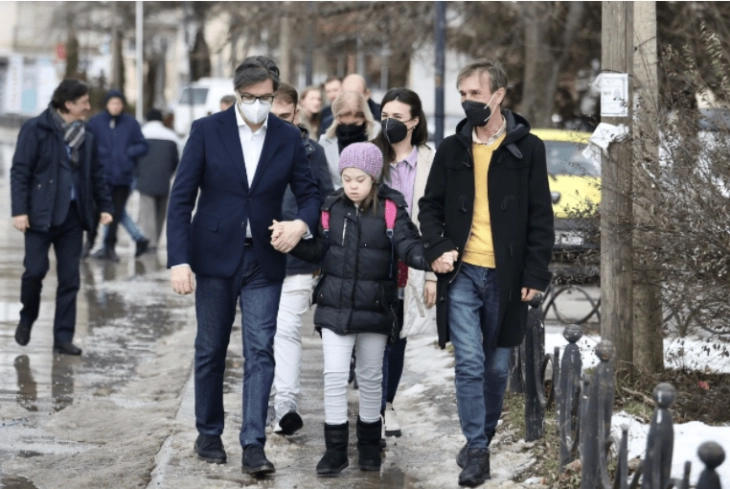President Pendarovski meets Embla Ademi’s family, says prejudice major obstacle to building equal, just society

Skopje, 7 February 2022 (MIA) – President Stevo Pendarovski visited on Monday the family of 11 year-old girl Embla Ademi, and the primary school “Edinstvo” in Gostivar, where Embla attends the classes.
She started with delay the second semester in her grade due to the boycott by the parents of her classmates who complained about the 11-year-old’s aggression caused by her Down’s Syndrome, which incited strong reactions in the public and from competent institutions last week.
President Pendarovski talked to Embla’s parents about the challenges she and her family face on a daily basis, focusing on opportunities to their overcoming.
Pendarovski encouraged the parents in their fight for the protection of the rights of children with atypical development and welcomed the Ombudsman’s quick reaction and the decision of the Commission for Protection against Discrimination to open a procedure in the case of Embla. Pendarovski underscored the importance of complying with the legal provisions of inclusion in education, emphasizing social responsibility, especially to vulnerable groups, his Office said in a press release.
He said that the behavior of those who endanger children’s rights is unacceptable, especially when it comes to children with atypical development. They should not only enjoy the rights they deserve, but also feel equal and welcome in the classrooms and schoolyard. It is our obligation, as a state, but also as individuals, and the key element in this common mission is empathy. It will help children like Embla, but it will also help us learn from them how to sincerely rejoice, share and be in solidarity, Pendarovski added.
Pendarovski referred to inclusiveness as an ambition that should not remain only declarative, but through practice to use the potentials of people with atypical development. Prejudices in that context are the major obstacle to building an equal and just society for all, he said.
He added that the responsible ministries and relevant authorities have a legal and moral obligation to provide inclusive education for all children in which the focus is on developing skills and abilities in children with different developmental processes, the press release reads.







